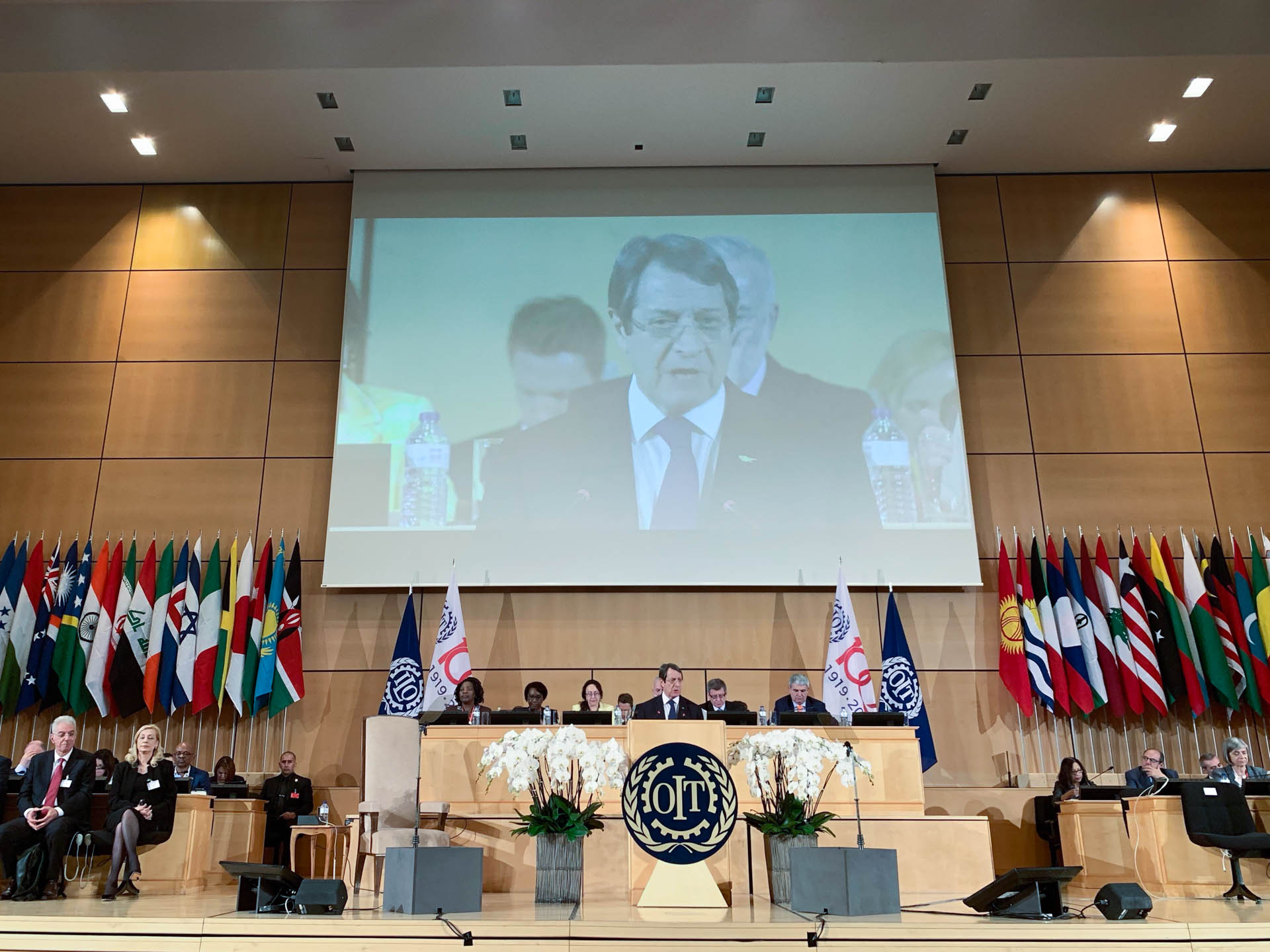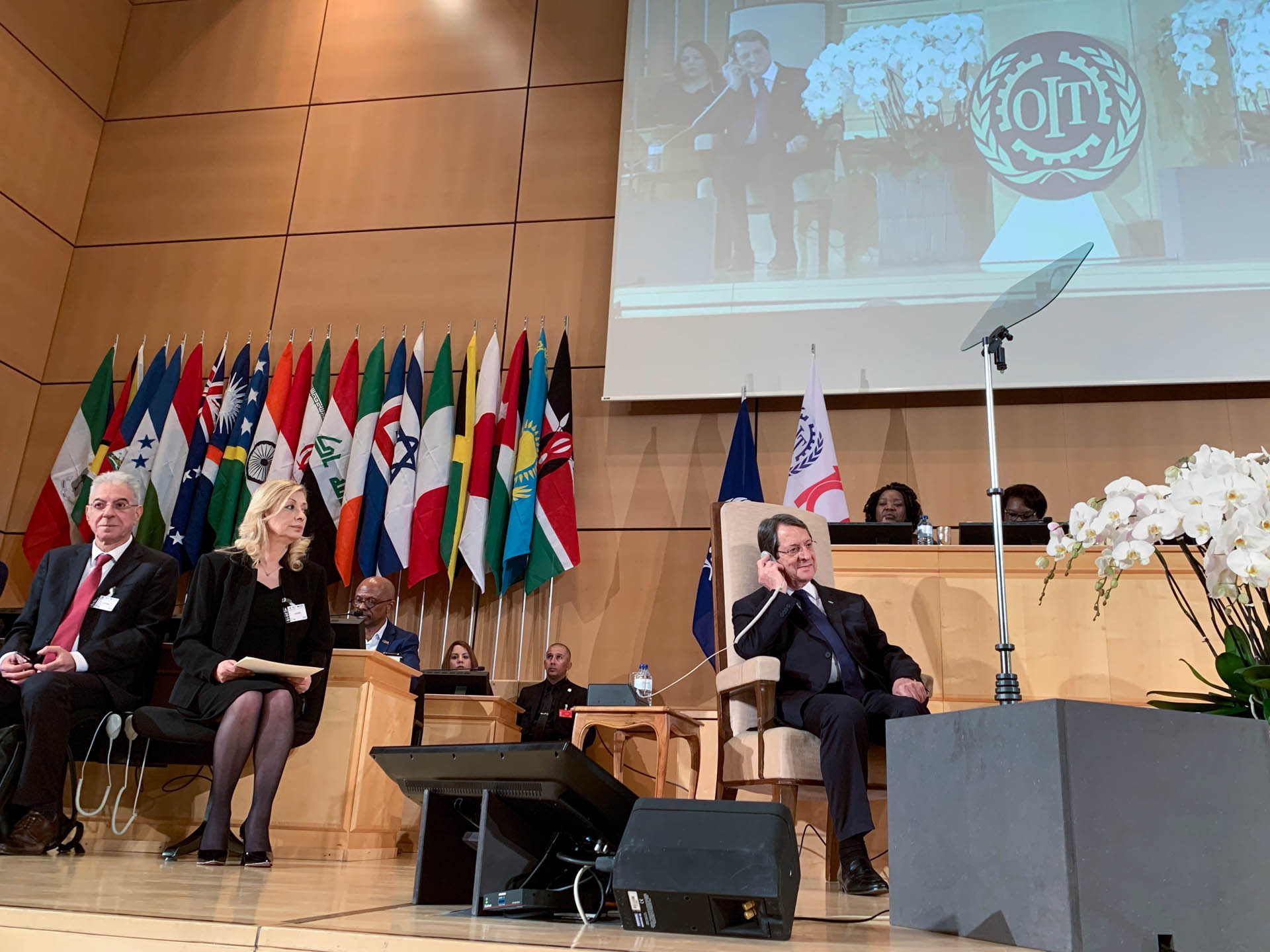Press Releases
11-06-2019 12:55
Address by the President of the Republic, Mr Nicos Anastasiades, at the Conference of the International Labour Organisation
At the outset, I wish to warmly congratulate Mr. Jean – Jackques Elmiger for his election to the Presidency of the International Labour Conference and to avail myself of this opportunity to convey my delegation’s full support in the exercise of his high duties.
At the same time, I wish not only to sincerely thank the Director-General of the International Labour Organisation, Mr. Guy Ryder, for his invitation, but, above all, to convey both mine and my Government’s genuine appreciation for his tireless work and invaluable contribution in advancing the Organisation’s objectives.
For more than a century, the ILO has established labour standards which serve as the regulatory framework for the world of work as a means of establishing decent work opportunities for all and achieving social justice through standards, such as: Social protection, the end of forced and compulsory labour, the end of child labour, the right to organise and bargain collectively, strengthening social dialogue and safeguarding the equal treatment among workers.
Nonetheless, we must acknowledge that the challenges ILO has to address today are much more diverse and complicated than the challenges it had to face 100 years ago, 50 years ago, or even ten years ago. Challenges such as an increasingly interdependent globalized world, a new digital era, a rapidly advancing research and innovation environment, the development of new types of business and economic models, as well as demographic and environmental changes, especially climate change.
As it is evident, these challenges affect the future of work and employment conditions and in turn, require the constant evolution and upgrading of the Organisation’s activities and policies, in line with our joint aim for each and every worker to benefit from labour protection and decent working conditions. Consequently, the world of work is undergoing a profound transformation and we strongly support the aims of the human-centred agenda as proposed by the Global Commission for the future of work in its landmark report. In this respect, we fully adhere to the proposed scope of the Centenary Declaration based on the aforesaid report aiming to integrate the Organisation’s future actions in its social justice mandate.
We are also in full agreement as regards the Organisation’s intention to adapt a Convention and Recommendation on Violence and Harassment in the world of work.
At the same time, we fully recognise the need for all member-states, as Cyprus has already done so, to implement the ILO Decent Work Agenda. This is vital in order to achieve our joint objectives as this year’s chosen theme adheres to “Advancing social justice, promoting decent work”. Further, we commend the complementary added value of the Brighter Future Report of the Global Commission to the 2030 Agenda for Sustainable Development and the UN Secretary General’s “Peace building and sustaining peace” Agenda.
All three agendas that converge with each other and their implementation in an interactive way, constitute the cornerstone of achieving in parallel social justice and sustainable development and peace.
Being recipients of the Organisation’s suggestions, as regards the way forward, in ensuring full and productive employment and providing decent work for all at global, regional, national and local levels, the goal remains to collectively implement ILO’s agenda. This requires solidarity, reciprocity, a dialogue with the social partners, and the commitment to proceed with determined actions both by the ILO and by each member-state individually.
As the preamble of the 1919 ILO Constitution states: “…Universal and lasting peace can be established only if it is based upon social justice”. It is for this exact reason that Cyprus and the ILO share a long-standing and deeply-rooted relationship based on upholding and promoting the founding values and principles of the Organisation.
In this respect, Cyprus has adopted the Organisation’s tripartite structure, through which representatives of the government and the employers and workers’ organisations exchange views and elaborate collectively labour standard policies. It is also worth recalling that we have ratified 57 Conventions and four Protocols of the Organisation.
At the same time, the already excellent co-operation between Cyprus and the Organisation significantly has strengthened following the economic crisis in 2013, with the ILO offering invaluable technical assistance, particularly through the Actuarial Valuation of our Social Insurance Scheme and on the issue of the Minimum National Wage.
It is a fact that the severe financial crisis in Cyprus that started in 2011 and the consequent need to enter into an Economic Adjustment Programme, in order to avoid the “disorderly bankruptcy” of the country, had adverse economic and social effects on the people. At the time, Cyprus was experiencing negative growth rates of around 6%, unemployment reached 16%, the government had budget deficits of 1 billion euro per year, the economy was in the junk category and was excluded from international markets.
As such, what became clear to all - the political parties, our social partners and the people in general – was the urgency of taking immediate measures and re-orienting our economic governance.
To this end, the key objectives of our policies, amongst others, were as follows:
- Adopting a prudent fiscal policy, with well - targeted expenditure policies.
- Maintaining a stable and competitive tax and legal regime so as to safeguard our comparative advantages as an attractive investment destination for International Businesses.
- Promoting measures and incentives which would facilitate economic and investment opportunities.
- Actively supporting the lower and middle-classes, not only by holding off the enforcing of new taxations, but particularly by lowering taxation levels or even fully abolishing some taxation levies.
- Pursuing significant structural reforms, amongst others, as regards the pension, welfare system, the health care system and tax administration and enhancing the labour market system.
The combination of our new economic and social policies, the resilience and strong foundations of our economy, as well as the sacrifices of the people but, above all, the constructive stance of our social partners led to maintaining labour peace and an impressive recovery. We currently enjoy a growth rate of around 4% and government budgets with primary surpluses, while the international status of our economy is at the Investment Grade. Unemployment has drastically fallen to less than 7% with a declining trend, there has been a parallel increase on real Gross Domestic Product per capita while income inequalities, as measured by the Gini coefficient, as well as the risk of poverty and social exclusion have improved considerably.
As a result of the economic growth it became feasible to implement a series of measures to the benefit of all employees and the vulnerable groups, thus strengthening the social safety net, such as:
- Introducing the Guaranteed Minimum Income Scheme through which we also increased the beneficiaries.
- Establishing for the first time a National Health System which was implemented on June 1st, 2019, which is a universal healthcare programme providing the opportunity to all to have access to quality healthcare.
- Raising twice the allowance received by low-income pensioners, including granting Easter and Christmas allowances.
- Introducing for the first time paid paternity-leave for 15 days.
- Enhancing the financial support to non-governmental organisations related with social care programmes, including day-care ones.
- Increasing the allowances received by disabled persons.
- Reintroducing the special mother-allowance granted to families with four children.
- Increasing the rent subsidies provided to all those eligible.
- Introducing a new housing policy for those in need.
- Abolishing the Special Contribution imposed on gross monthly earnings of employees, both in the private and public sectors.
- Restoring the system of the annual wage indexation for employees.
- Following the implementation in the public sector of a code of conduct based on international best practices on harassment in the work environment, the social partners also adopted a relevant code in the private sector.
- Deciding to establish for the first time the “Woman’s House” in order to offer protection, psychological and any other assistance by the competent authorities, to women who were victims of violence, under one roof.
However, despite the progress we have achieved, we do acknowledge that maintaining social justice, further reducing unemployment and enhancing quality and decent working conditions, needs constant attention and evolution of our policies in order to adapt to a constantly changing labour market environment. In this regard, we are continuously developing and implementing national plans to address the challenges of the future of work by tackling the skills mismatch through in - work – training, re-skilling and up-skilling and by promoting entrepreneurship.
With the valuable technical assistance of the ILO and the contribution of our social partners, we intend to engage in a dialogue to establish a national minimum wage, once conditions of full employment are in place.
Please allow me to warmly welcome and commend the initiative at a European level to establish a European Labour Authority (ELA). Based on our continuous support for the establishment of such a common labour authority and our commitment to promoting fair working conditions, social cohesion and the implementation of the European Pillar of Social Rights, we have offered to host the European Labour Authority in Nicosia.
I feel privileged being at this historic centenary celebration. I can only express my full support to the principles of the human-centered agenda put forward by the Global Commission report, that is:
- Increasing investment in peoples’ capabilities.
- Increasing investment in institutions of work.
- Increasing investment in decent and sustainable work.
It is my strong and firm belief that it is only by collectively adhering to the aforesaid principles that we can achieve growth, social justice and prosperity, for current and future generations.
(RM/EK/II)
Relevant Press Releases

19-04-2024 16:42
PIO e-mail Αlerts service is suspended




15-04-2024 14:04
The Ambassador of Cyprus to South Sudan presented her credentials




